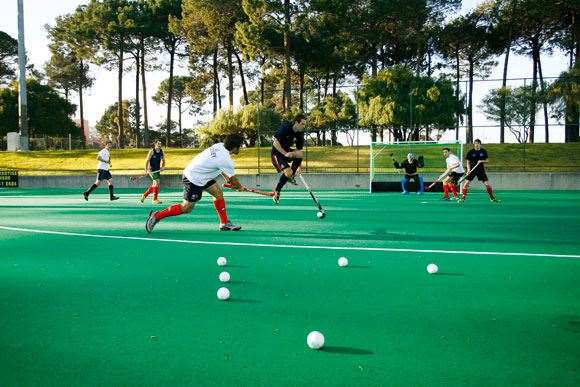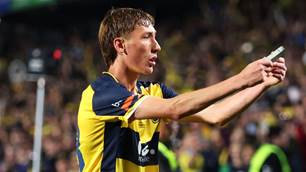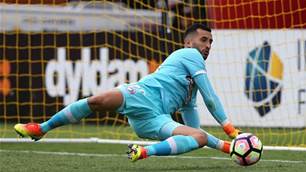For so long it was the rest of the hockey world doing all the laughing as the Kookaburras flew in and left Olympic Games gold medal-less.
For so long it was the rest of the hockey world doing all the laughing as the Kookaburras flew in and left Olympic Games gold medal-less.
 Three-on-three or six-on-six games at training are the ultimate conditioning tool
Three-on-three or six-on-six games at training are the ultimate conditioning toolImages: Theron Kirkman
Their breakthrough win at Athens 2004 not only shook a very irritating monkey off the Aussies’ backs, it blasted them back to the top of the men’s hockey tree.Since that epic 2-1 extra-time victory over the Dutch in the gold medal showdown, our boys have finished champions in the ’05 Champions Trophy, runners-up at the ‘06 World Cup, 2006 Commonwealth Games gold medal winner and second and title holders in the ‘07 and ’08 Champions Trophies respectively. A bronze behind gold-medallists Germany and second-placed Spain at Beijing last year wasn’t to be sneezed at, either. Part of the problem for our international rivals has been Liam De Young, a defender/midfielder who’s been a key part of the Kookaburras squad since being honoured with their Best Young Player gong in 2001. “DY”, a proud Queenslander, lets nothing through, is extremely quick and has over 200 caps of international experience behind him.The Commercial Law and Sports Management degree student was accommodating enough to take us through a typical week in camp with the Kookaburras at their base at the Perth Hockey Centre. Watch out for him against the Poms, Germans, Koreans, Dutch and Spanish at the ’09 edition of the Champions Trophy in Melbourne from November 28 to December 6.
AROUND THE WORLD
“The Kookaburras squad has to peak two or three times each year. By peak, I mean finalising preparations for our biggest tournaments. Internationally we play all year round, so there’s not so much a ‘season’, if you like. This year we played some home games in January against Holland, followed in February with some against Belgium. In June we headed over for the Hamburg Masters in Germany. In August we had our World Cup qualifying event – that was well and truly our major focus for the year.
“The tours to Europe and the games we played in January and February were all important matches, but I guess they were all used to select a squad and really put things in place for a big performance in August. We managed to knock New Zealand off over there, so we’ve qualified for the World Cup, meaning we don’t have to play any repechage games.
“Training wise, our work depends on what phase we’re in. At the moment our phase is a bit of a conditioning one – less hockey focused and more of a focus on conditioning. Once the whole squad assembles in Perth for our final preparation for this year’s Champions Trophy, we’ll come into more hockey-specific, gameplay-type training.”
THRILLS AND SKILLS
“A standard week would involve three skills/field sessions. We’ll incorporate team strategies; set plays, attacking and defensive plans, a lot of general gameplay. “In hockey you have your pretty standard set plays; your penalty corner, attacking penalty corners in defence etc. What we work out and really focus on depends on who we’re playing or what options we want to use. We finish off every session with those specifics, but on Saturday mornings we have a whole session dedicated to them.
“Handling penalty corners in hockey is a pretty well-drilled and executed skill which we put a lot of energy into perfecting. It might surprise some, but we focus a lot on basic skills, too, which players tend to neglect once they’re at the top level. The focus for players can often be on presuming you have those basic skills, but unless you’re consistently working on them, they’re difficult to maintain. The motto our coach Ric Charlesworth – who is coaching the men after a lot of success coaching the Hockeyroos – uses is that good players do the basic things very often and, when required, pull out the extravagant tricks.
“In the conditioning phase we’re in now, where we’re not handling the ball as much as we usually do, once you go near the ball you can notice your basic skills aren’t quite right. But once you’re back into it for a few sessions, you regain your sharp skills pretty quickly. A skills/field session [not including a warm-up and stretching] generally lasts an hour and a half.”
Related Articles

Socceroo-in-waiting seals Championship deal

Fringe Socceroo swerves A-League to remain in Europe after Fulham exit













